Russia of the XIII century. What's scarier: a western or eastern threat
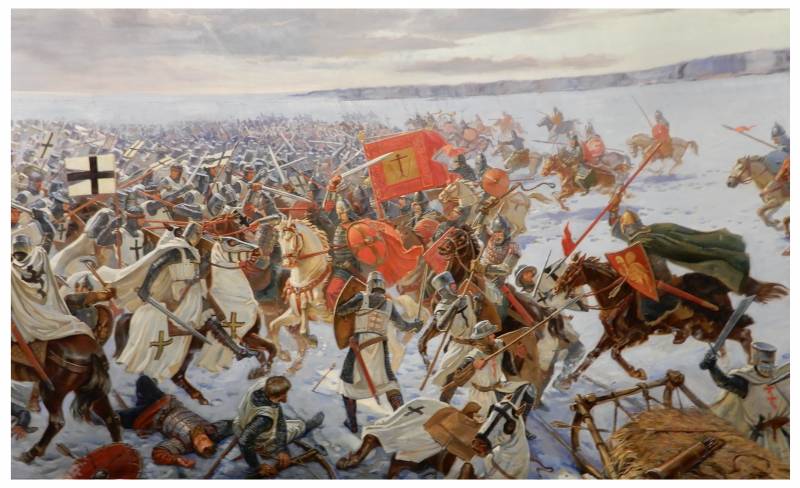
Diorama (detail) Battle on the Ice. Artist Evgeny Emelyanov. Exhibition: "History through the eyes of an artist. On the occasion of the 800th anniversary of the birth of Alexander Nevsky ”. Tretyakov Gallery. Moscow. Photo by the author
In the XII-XIII century. Russian principalities in the west bordered on various tribes, ethnic groups and states. These are, first of all, Estonians, Latvian, Lithuanian tribes, German knightly orders and the Scandinavian states. Hungary and Poland, participating in Russian strife, for the time being did not claim the Russian lands.
In the XNUMXth century, after the Mongol invasion, the struggle between the principalities and princes for "tables" in Russian cities, for tributes from neighboring tribes, went on, despite the pogrom perpetrated by the Tatars. It is difficult to say that the western neighbors decided to take advantage of the situations when there was a significant weakening of a number of Russian lands, although it was not without it.
It should be borne in mind that the Russian lands were "sovereign" states, interconnected by temporary allied ties. There was no "united Russia", as the historical school of B. Grekov, prevailing in the USSR, represented, as there was neither feudalism, nor feudal fragmentation, due to its still absence in the vastness of Eastern Europe. About which there is no evidence in the sources.
But the reasons for the pressure from the Scandinavians and the Germans had different roots and began long before the onset of the Mongol invasion.
It was not easy to cope with a direct or potential threat posed by our western neighbors during the XNUMXth century, and in some places even went on the offensive.
First. The cities of Western Russia bordered on Poland and Hungary, making campaigns for tribute against the Baltic tribes of the Yatvingians, Zhmudi and Lithuania, directly or indirectly becoming allies of the German crusaders.
Second. Coincidentally, at this time, from the end of the XII century. Lithuanian tribes entered the stage of tribal consolidation, which the East Slavic tribes underwent in the XNUMXth century. This stage corresponds to an active external expansion, which manifests itself, first of all, in the raids on neighboring, rather rich Russian and Polish lands, fighting against the orders (Livonian and Teutonic). Russian princes contacted the Lithuanian princes, using them as mercenaries, and Russian cities willingly invited warlike Lithuanian princes with their squads.
Thus, in the XIII century. the threat from Lithuania to the neighboring Russian principalities, of course, was, but it was actively stopped by the Russian princes, who significantly influenced the situation in Lithuania.
Third. In the XIII century. German military expansion in the Baltics was associated with the crusading movement.
Their first offensive in Central Europe was associated with the colonization of the Western Slavs, through their conversion to Christianity. Further, the object of the expansion of the crusaders was the Lithuanian tribes, at first the western ones, the Prussians. It is worth noting that often the orders of the crusaders came to the territory of their expansion with the support, at the request, or at least non-resistance of the Polish (as in the case of Prussia) and Russian (as in the case of the territory of modern Latvia and Riga) authorities.
By the time the warriors-missionaries arrived in these lands, some of the Baltic and Finnish tribes (modern Latvia) paid tribute to the city-state of Polotsk (modern Belarus) and Smolensk, and the Finnish tribes (eastern and central modern Estonia, the territory of modern Finland and the Karelian Isthmus ) - to Pskov and Novgorod.
It should be noted that, despite the outlined delimitation between the two Christian branches, very sharp contradictions were not observed in 1204 before the fall of the capital of Byzantium and the Orthodox center of the world - Constantinople. In the middle of the XII century. Byzantium still claimed the return of Rome under its control and formed its own union of Italian states.
The primitive system of exploitation with the collection of tribute, established by the ancient Russian principalities within the framework of their social system for the tribes of neighboring territories (Estonia, Latvia, Southern Finland), did not imply either the destruction of the tribal elite, nor the creation of outposts where the payment of tribute was carried out more or less regularly, but where tributes were paid personally to princes, they did not have the strength to organize any other system of government, except as punitive campaigns:
While the orders, and the Scandinavians, along with baptism, changed the structure of the colonized society in an early feudal manner.
I repeat, the East Slavic city-states were at the stage of a neighboring-territorial community, and feudalism was far enough here, in contrast to Western countries. Under the rule of the orders, the local population became a feudal-dependent peasantry; even, albeit partially, the local nobility fell into this category.
The German crusaders created a network of knightly castles to ensure the submission of the exploited population. Note that in the process of colonization, they used not only a sword, but also a carrot, for example, they made a grace period for payments of feudal rent, established fixed fees, in contrast to permanent tributes to Russian princes.
This movement of a more developed society, firstly, sharply weakened the economic positions of the Russians, first of all, Polotsk, Smolensk, and then Novgorod in the Baltics.
The pressure of the Western crusaders caused the process of consolidation of the Lithuanian tribes, which were at the stage of "military democracy", that is, the disintegration of the tribal structure, which, in turn, began active raids on the lands of neighboring Russian volosts.
In the end, after the conquest of the lands in the Baltic States, the crusaders also reached the borders of the Novgorod city-state. The borders, established in 1224, remain after the collapse of the USSR to this day.
At the same time, the Scandinavian states, which traditionally raided the lands of the Finno-Ugrians, took part in the aggression in this region, using the ideological motives of the baptism of pagans.
In the XIII century. clashes between bordering Russian lands and German orders were inevitable.
Historical analysis shows that it was not the planned "Drang nach Osten", and the term itself originated in the middle of the XNUMXth century. during the polemic of Polish and German publicists.
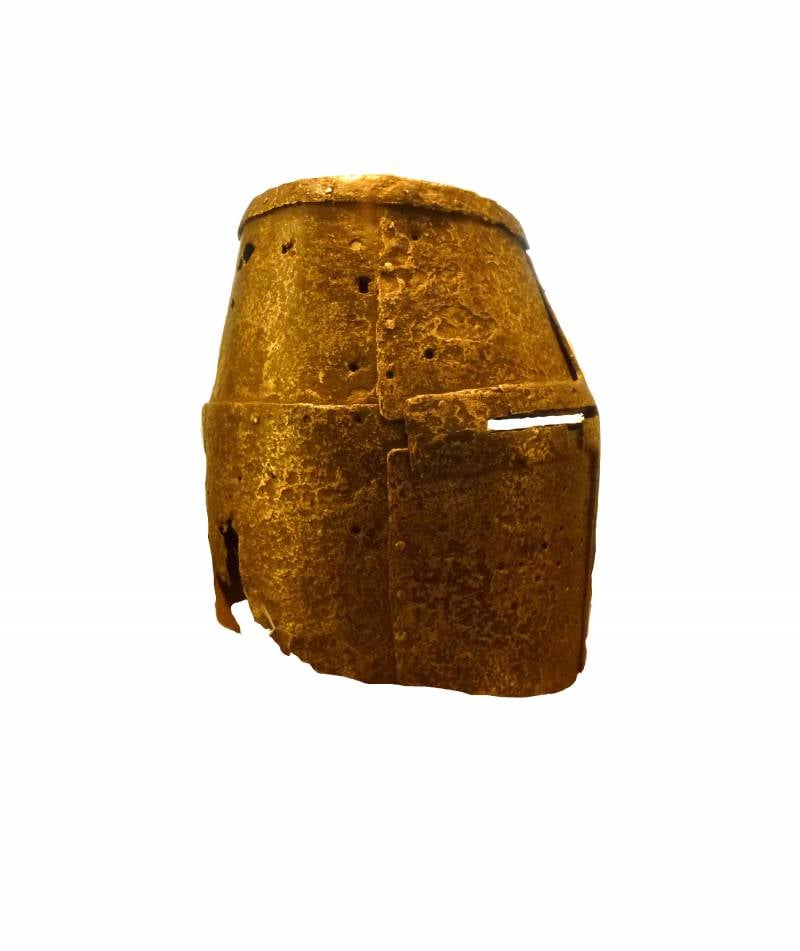
German helmet. Second half of the XNUMXth century The period of German expansion in Pomerania to the West Slavic lands. Pomerania. Museum of German History. Berlin. Germany. Photo by the author
It is important to note that a certain weakness of the Russian lands and the rather rapid transition of the lands of Russian tributaries under the rule of orders and bishops are associated with the fact that the Russian city-states, firstly, were at a stage when the capture of foreign regions did not seem to them a necessary goal when it was possible to get by with the receipt of permanent tribute, in contrast to the early feudal German orders, for which it was the acquisition of lands with a feudal-dependent population that was the natural and main goal - in fact.
So, the former Russian outpost in Estonia - Yuryev (modern Tartu) was taken by the sword-bearers long before the Mongol invasion: the first time - in 1212, the second - in 1224. The first economic blockade of Novgorod by the Western allies took place in 1229–1230. And the formal reason for the German invasions of the Pskov land was the kinship of Prince Vladimir Mstislavovich with the nobility of the Dorpat (Dorpat) bishopric and their claims to Pskov, first with the aim of returning the table to Vladimir's son Yaroslav, and then with the aim of subjugating Pskov directly.
The culmination of the expansion of the orders and the Scandinavians allied to them coincided with the Mongol-Tatar pogrom of the Russian lands in the 40s – 60s of the 1234th century, despite the fact that in XNUMX Yaroslav Vsevolodovich dealt a tangible blow to the Estonian sword-bearers in the Battle of Emajõge (Omovzhe).
These successes were not of fundamental importance, although they temporarily undermined the enemy's forces: a class feudal society acted against the sporadic actions of society during the period of the territorial community, the system of which had significant organizational and technological advantages.
From the point of view of European medieval society, the lands of the pagans were considered nobody's, the fact that the Russian principalities took tributes here was not taken into account.
A crusade against the pagans of Finland was announced in 1237. In this connection, ahead of all, the Swedes moved to the territory of Novgorod's tributaries - Izhora, a Finno-Ugric tribe that lived on the Neva River. In fact, it was a Swedish raid, since the young Alexander Yaroslavovich defeated the arriving invaders in the famous Battle of the Neva on July 22, 1240 by the forces of his own squad, with the support of some warriors from Novgorod and Ladoga, the participation of the entire Novgorod militia was not needed.
The non-participation of the Novgorod militia (warriors) in the battle testifies to the insignificance of the arriving troops, otherwise it was not realistic to cope with them with the help of one squad.
Without underestimating the historical and political significance of the victory of Alexander, nicknamed after her - Nevsky, it should be understood that this was a local battle.
In 1241, within the framework of the baptismal concept of the same Izhora, powerful forces of the German order, with the support of one of the city parties, captured Pskov. This party in subsequent historiography was presented as traitors. Note that city-states and city parties often attracted outside forces.
Alexander Yaroslavovich with the squads of the north-east of Russia and the Novgorodians liberates Pskov from the German garrison, expels the Germans from the Izhora land, and gives battle on April 4, 1242 on the shores of Lake Peipsi.
This is the second victory of Alexander Yaroslavovich, which has become a symbol of the Russian weapons and victory over Western aggression. But this realization of this event happened later.
Let's pay attention to several important factors.
First, the Germans conquered the large Russian cities of Izborsk and Pskov for the first time, and the battle that followed after their expulsion was extremely important in itself.
Secondly, the Battle of Peipsi fits into the framework of the battles of the 1261th century. in the northwest of Russia. It is equal or even inferior to the victory of Father Alexander at the Battle of Emajig and is comparable to the Battle of Rakovor in XNUMX. But it cannot be spoken of as a battle that caused irreparable damage to the order.
The next major clash and battle took place in 1268 at Rokovor (the territory of modern Estonia), the German chroniclers, as always, exaggerated the number of soldiers from Russia, perhaps the Russian army was more numerous, but, of course, not many times. In Russian historiography, it is customary to consider the Russians as the winners, the German chronicle writes about their victory, there is no unequivocal opinion. The retaliatory campaign of the Germans and Danes to Pskov gave nothing.
Border clashes and border raids on both sides continued constantly and later, but by the end of the XNUMXth century. military pressure on the Russian borders is falling.
German crusaders and Danes were able to gain a foothold in the Baltic States, and neighboring Russian principalities stopped claiming tribute from those tribes that fell under the rule of aliens. The “brethren” were able to extend their influence and order to the tribes they baptized, but abandoned attempts to seize some of the border Russian lands. The crusaders were engaged in the establishment of feudal order in this territory.
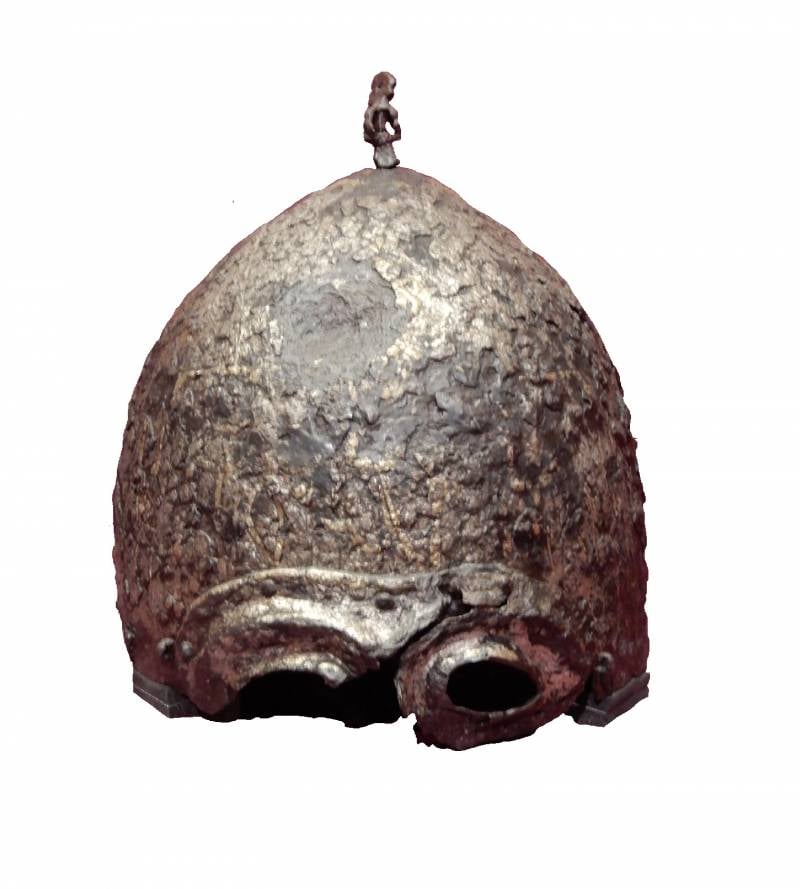
Russian helmet. XIII-XIV centuries. Gorodetsky Historical and Art Museum Complex. Photo by the author
It is worth saying that even after the crusaders took the capital of Eastern Christianity, Constantinople in 1204, the clashes between the Russian principalities and their western neighbors, first of all, were in the nature of border wars for material resources, and not for faith. Although the motive of faith was present.
Without underestimating the significance of the military victories of Russian weapons and the subsequent propaganda (in a very good sense of the word) significance of these victories for the growth of the people's self-awareness, it should be noted that these threats in the XIII century. in no way can be compared with the Mongols.
The question of opposing the Mongols and Western invaders, or who was more terrible for Russia in the 1435th century, arose much later. He was significantly influenced by the fact that the Muslim Turks took Constantinople in XNUMX with his question, which is still open today: which is better - a turban or papal tiara, as well as subsequent clashes with Western neighbors during the period of Ivan the Terrible, when the canonization of Alexander Nevsky took place.
But such a dilemma in the XIII century. for the Russian lands was not. The military superiority of the Russians in the west and north-west of Russia was, if not absolute, then very obvious.
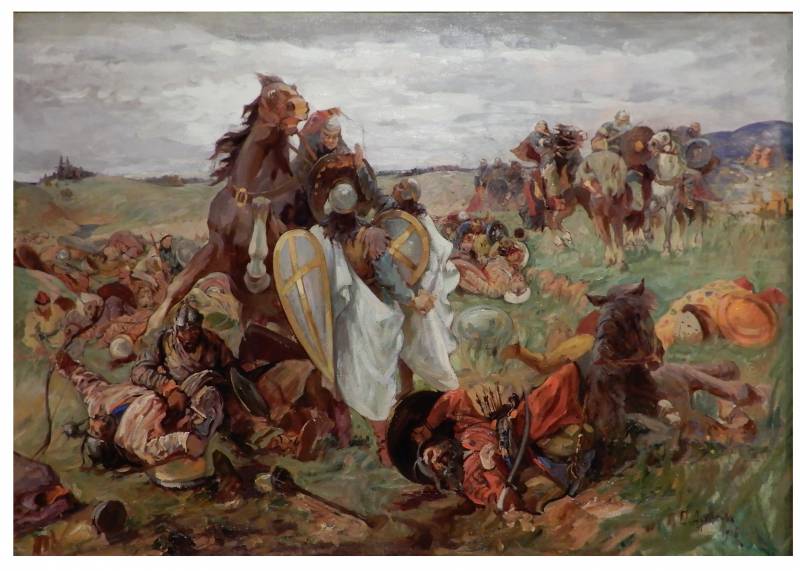
Clash between Russians and Tatars. XIII century. 1916. Artist Sergei Arkhipov. Military History Museum of Artillery. Engineering and communications troops. SPb. Photo by the author
Of course, under the conditions of the establishment of the Tatar-Mongol yoke, the loss of tribute from the Baltic and Finnish tribes was a significant problem for a number of Russian principalities, but this process, as we have seen, began long before the Mongol invasion: the Scandinavian, but especially German, crusaders were able to capture and to secure the lands of the Baltic states.
A different situation developed with the Tatar-Mongol invaders, whose military advantage was absolute.
Bibliography:
"Chronicle of Livonia" by Henry // Matuzov V. I., Nazarova E. L. Crusaders and Russia. End of the XII century. - 1270 M., 2002.
Matuzova V.I., Nazarova E.L. Crusaders and Russia, end of the 1270th century, 2002. Texts. Translation. Commentary - M., XNUMX.
Nesterenko A.N. Bishop Albert // VI. No. 2. 2015.
Razumovskaya L.V. Jan Douglash and the Battle of Grunwald. SPb, 2007.
Khrustalev D.G. Northern Crusaders. SPb. 2018.
Tsimbaev KN From the history of the concept "Drang nach Osten" // VI. No. 12. 2015.
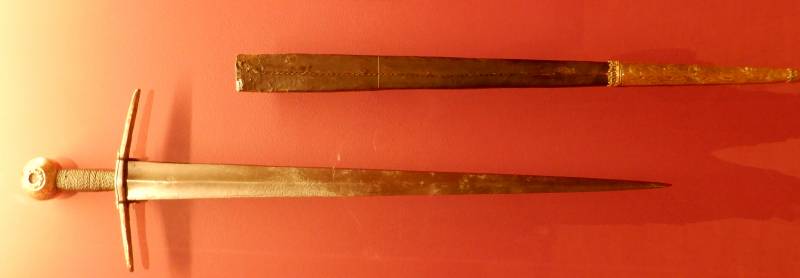
Information